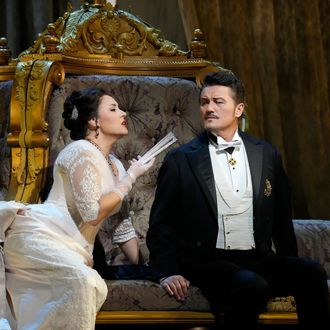
Fedora is an opera about décor. It stars a Russian palace, a Parisian ballroom, and an Alpine villa in Switzerland, with costumes to match the various forms of splendor. The clothes need singers to wear them, of course, and the rooms look better when filled with music. The corollary is that the score sounds juiciest when the opulence is sufficiently excessive, and David McVicar’s new production for the Metropolitan Opera gets partway to the right degree of too much. Charles Edwards’s sets offer a whole catalog of coffered ceilings, gilt-trimmed circular sofas, and diamond-patterned wall coverings to go with Brigitte Reiffenstuel’s glittery gowns and tiaras. But a downmarket feeling creeps in as bits of one act’s mansion get recycled for the next. By the time the troubled couple of Russian expats retreats to the mountains in Act III, dressed in country whites, they seem to have landed in a pleasantly airy, if slightly neglected, Airbnb.
Fedora hasn’t been seen in New York since the 1996–97 season, when a memorably lavish production by Beppe De Tomasi made its Met debut and was promptly sent back to its owner, the Gran Teatre del Liceu in Barcelona. The reason for both its coming and going back then was Mirella Freni, the legendary soprano who used the title role as a good-bye gift to New York audiences — and to prove that she still had plenty of fire in her voice. A quarter-century later, the Met has had to settle for a B-plus production of a B-minus opera starring an A-list soprano, Sonya Yoncheva, who, for all her talents, sings the role as if she finds it slightly embarrassing. Fortunately, she has the genuinely impassioned tenor Piotr Beczala as Loris to lean on and plenty of support from the conductor, Marco Armiliato.
The new production opened on New Year’s Eve, and when I caught up with it a few days later, a certain hung-over sluggishness took an act or two to dissipate. Yoncheva’s voice grazed the guardrails now and then. While she seemed perfectly at home with the haughtiness that is the birthright of a Russian princess, she seemed less comfortable with all the melty, weak-kneed, please-forgive-me effusions that are the ineluctable fate of a verismo soprano heading for the final curtain. Opera of this kind favors the grand diva who can hurl herself into all those clashing passions — the high-note hatreds and inflamed loves (in this case for the same person) — without worrying about the dangers of preposterousness. Yoncheva isn’t that kind of singer. Even as her voice warmed and her delivery loosened, she still sounded as though she were negotiating with her character, trying to make Princess Fedora more reasonable and dignified than she is.
This opera contains all the right components of melodrama: murder, betrayal, vengeance, and a pining mother back home, plus the up-to-the-minute-in-the-1890s touch of an aria about bicycles. Letters get lost, then show up just in time to ruin everything. Political extremism lurks at the margins of the story, where the red herrings are kept. And through it all, Umberto Giordano’s score keeps churning mightily, trying to make the whole plot soar. It does kick up one two-minute gem of salon seduction, Loris’s “Amor ti vieta.” That artful version of the I-know-your-no-means-yes number has been a tenor staple since the days of Caruso, usually deracinated from its original context. The rest of the yearning and lamenting sounds like an early draft of a Puccini opera, before all the rhythmic screws were tightened and the melodies buffed.
Don’t take my word for it. “I’m not going to pretend that this is a neglected masterpiece,” McVicar recently remarked to the Times. “But it is an extremely effective piece of music theater.” I’d say that’s a pretty soft sell.





